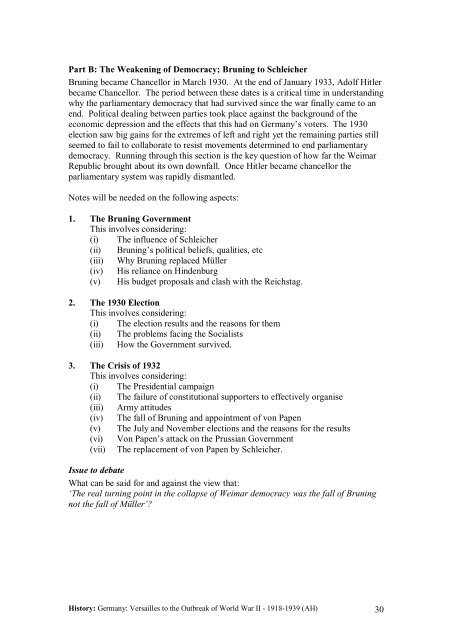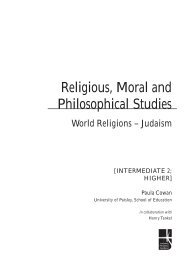PDF file: History - Advanced Higher - Germany - Education Scotland
PDF file: History - Advanced Higher - Germany - Education Scotland
PDF file: History - Advanced Higher - Germany - Education Scotland
Create successful ePaper yourself
Turn your PDF publications into a flip-book with our unique Google optimized e-Paper software.
Part B: The Weakening of Democracy; Bruning to Schleicher<br />
Bruning became Chancellor in March 1930. At the end of January 1933, Adolf Hitler<br />
became Chancellor. The period between these dates is a critical time in understanding<br />
why the parliamentary democracy that had survived since the war finally came to an<br />
end. Political dealing between parties took place against the background of the<br />
economic depression and the effects that this had on <strong>Germany</strong>’s voters. The 1930<br />
election saw big gains for the extremes of left and right yet the remaining parties still<br />
seemed to fail to collaborate to resist movements determined to end parliamentary<br />
democracy. Running through this section is the key question of how far the Weimar<br />
Republic brought about its own downfall. Once Hitler became chancellor the<br />
parliamentary system was rapidly dismantled.<br />
Notes will be needed on the following aspects:<br />
1. The Bruning Government<br />
This involves considering:<br />
(i) The influence of Schleicher<br />
(ii) Bruning’s political beliefs, qualities, etc<br />
(iii) Why Bruning replaced Müller<br />
(iv) His reliance on Hindenburg<br />
(v) His budget proposals and clash with the Reichstag.<br />
2. The 1930 Election<br />
This involves considering:<br />
(i) The election results and the reasons for them<br />
(ii) The problems facing the Socialists<br />
(iii) How the Government survived.<br />
3. The Crisis of 1932<br />
This involves considering:<br />
(i) The Presidential campaign<br />
(ii) The failure of constitutional supporters to effectively organise<br />
(iii) Army attitudes<br />
(iv) The fall of Bruning and appointment of von Papen<br />
(v) The July and November elections and the reasons for the results<br />
(vi) Von Papen’s attack on the Prussian Government<br />
(vii) The replacement of von Papen by Schleicher.<br />
Issue to debate<br />
What can be said for and against the view that:<br />
‘The real turning point in the collapse of Weimar democracy was the fall of Bruning<br />
not the fall of Müller’?<br />
<strong>History</strong>: <strong>Germany</strong>: Versailles to the Outbreak of World War II - 1918-1939 (AH) 30
















